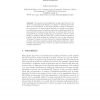Free Online Productivity Tools
i2Speak
i2Symbol
i2OCR
iTex2Img
iWeb2Print
iWeb2Shot
i2Type
iPdf2Split
iPdf2Merge
i2Bopomofo
i2Arabic
i2Style
i2Image
i2PDF
iLatex2Rtf
Sci2ools
106
Voted
DAGSTUHL
2003
2003
The Need to Adapt and Its Implications for Embodiment
We present the hypothesis that an important factor for the choice of a particular embodiment for a natural or artificial agent is the effect of the embodiment on the agent’s ability to adapt to changes in the environment. To support this hypothesis, we discuss recent empirical results where sensor morphology was found to significantly affect the time needed for learning a given task. Also, we discuss other recent experiments where a unique optimal sensor morphology could be evolved simply by requiring that the agent had to learn its task as quickly as possible. Both these findings are explained by the recently discovered ”Principle of Unique Local Gain Factors for Optimal Adaptation” which provides a first step towards a general mathematical setting for understanding the interdependence between an agent’s embodiment and its learning performance.
Related Content
| Added | 31 Oct 2010 |
| Updated | 31 Oct 2010 |
| Type | Conference |
| Year | 2003 |
| Where | DAGSTUHL |
| Authors | Lukas Lichtensteiger |
Comments (0)

